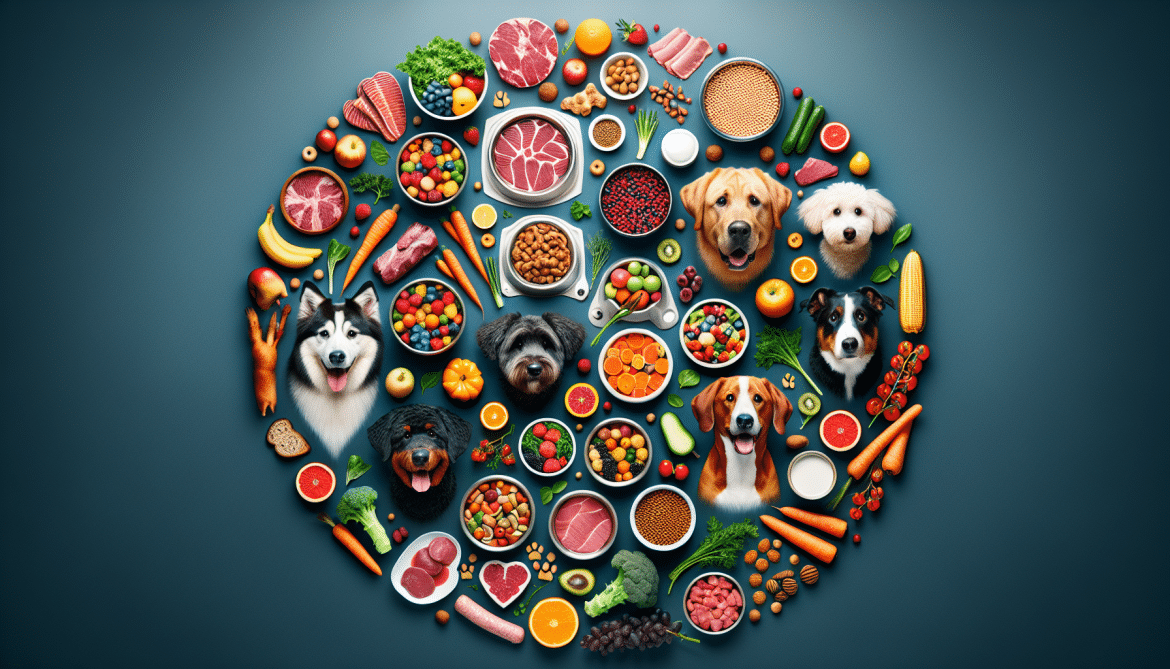Are you a proud dog owner? Well, you know how important it is to provide the best care for your furry friend. But did you know that different dog breeds have unique nutritional needs? Understanding these needs is crucial to ensuring that your pup receives the right balance of nutrients for optimal health. In this article, we will delve into the world of dog nutrition and explore how various breeds have specific dietary requirements. From small and energetic terriers to larger and more sedentary breeds, let's dive into the fascinating world of understanding the nutritional needs of different dog breeds.

This image is property of images.pexels.com.
Understanding the Nutritional Needs of Different Dog Breeds
When it comes to taking care of our furry friends, understanding their unique nutritional needs is essential. Different dog breeds have varying requirements when it comes to their diets and understanding these needs is crucial for their overall health and well-being. In this comprehensive article, we will delve into the basics of dog nutrition, explore the factors that influence their nutritional needs, and examine the unique requirements of various dog breeds.
Knowing the Basics of Dog Nutrition
Before we dive into the specific nutritional needs of different dog breeds, it's important to understand the basics of dog nutrition. Dogs, like humans, require a balanced diet that provides them with essential nutrients to support their growth, development, and overall health. The three main nutrients that dogs need are proteins, carbohydrates, and fats.
Proteins are the building blocks of cells and tissues in a dog's body. They are vital for muscle growth, repair, and maintenance. Sources of high-quality proteins for dogs include meat, fish, and poultry. Carbohydrates provide dogs with energy, and they can be derived from grains, vegetables, and fruits. Fats are necessary for hormone production, insulation, and absorption of fat-soluble vitamins. Healthy fat sources for dogs include fish oil and plant oils.
Feeding Schedule and Portion Control
Establishing a proper feeding schedule and practicing portion control is crucial for maintaining optimal nutrition for your dog. While the specific frequency and amount may vary depending on the breed and size of your dog, it's generally recommended to feed adult dogs twice a day. Puppies may require more frequent feeding throughout the day.
Portion control is essential to prevent overeating and obesity in dogs. It's crucial to follow the guidelines provided by your veterinarian or on commercial dog food packaging. Keep in mind that factors such as age, weight, and activity level should also be taken into consideration when determining the appropriate portion size for your furry companion.
Importance of Fresh Water
In addition to a balanced diet, fresh water is a fundamental aspect of your dog's nutritional needs. Water plays a crucial role in digestion, absorption of nutrients, and overall hydration. Ensure your dog has access to clean, fresh water at all times to prevent dehydration and keep their bodily functions running smoothly.

This image is property of images.pexels.com.
Factors that Influence Nutritional Needs
Now that we have covered the basics of dog nutrition, let's delve into the factors that influence the nutritional needs of different dog breeds. Understanding these factors will help you tailor your dog's diet to meet their specific requirements, ensuring they receive the optimal nutrition for their overall health and well-being.
Life Stage and Age
The nutritional needs of a dog vary depending on their life stage and age. Puppies require a diet that promotes healthy growth and development while adult and senior dogs have different requirements. For instance, puppies need higher levels of protein and calories to support their rapid growth, while senior dogs may benefit from lower-calorie diets to prevent weight gain and support joint health.
Size and Weight
The size and weight of a dog also play a significant role in determining their nutritional needs. Small dog breeds, such as Chihuahuas, have higher metabolic rates and may require diets with higher calorie content to sustain their energy levels. On the other hand, large dog breeds, like Great Danes, have slower metabolism and may benefit from lower-calorie diets to prevent obesity and joint issues.
Activity Level
The activity level of a dog determines the amount of energy they require from their diet. Highly active dogs, such as those involved in agility training or working dogs, may need diets with higher calorie content to fuel their intense physical activity. Conversely, less active dogs, such as lapdogs or those with limited exercise, may require a more controlled diet to prevent weight gain.
Specific Health Conditions
Certain health conditions, such as allergies, food sensitivities, or medical conditions like diabetes or kidney disease, can significantly influence a dog's nutritional needs. Dogs with allergies or sensitivities may require a specialized diet that avoids common allergens, while dogs with medical conditions may need tailored diets prescribed by their veterinarian to manage their specific condition.

This image is property of images.pexels.com.
Different Dog Breeds and Their Unique Nutritional Requirements
Now that we have a solid foundation of dog nutrition and understand the factors that influence their nutritional needs, let's explore the unique requirements of different dog breeds. Each breed has its own specific characteristics and activities, which contribute to their distinct nutritional needs. Let's take a closer look at the nutritional requirements of various dog breeds.
Small Dog Breeds
Small dog breeds, such as Yorkshire Terriers and Shih Tzus, have unique nutritional requirements due to their small size and high metabolic rate. These breeds often require diets with higher calorie content to meet their energy needs. Additionally, small breeds are prone to dental issues, so it's important to choose kibble sizes appropriate for their small mouths and consider dental health when selecting their diet.
Large Dog Breeds
Large dog breeds, such as Golden Retrievers and German Shepherds, have different nutritional needs compared to smaller breeds. They have slower metabolic rates and are prone to joint problems, like hip dysplasia. Diets for large breeds often focus on controlled growth to avoid putting excessive strain on their developing joints. They may also benefit from added supplements, such as glucosamine, to support their joint health.
Medium Dog Breeds
Medium-sized breeds, such as Bulldogs and Cocker Spaniels, fall between small and large breeds in terms of nutritional requirements. They require diets that provide a balance of nutrients to support their energy levels and overall health. Medium breeds are also prone to certain health issues, such as allergies or sensitive digestion, so choosing a diet that addresses these specific needs is important.
Toy Dog Breeds
Toy dog breeds, like Chihuahuas and Pomeranians, have unique nutritional needs due to their small size and high energy levels. They require diets that are nutrient-dense to fuel their active lifestyles. Toy breeds are also prone to dental issues, so it's crucial to select a diet that promotes dental health and consider the size of the kibble to ensure they can comfortably eat.
Working Dog Breeds
Working dog breeds, such as Border Collies and Siberian Huskies, are highly active and require diets with higher calorie content to support their physical exertion and endurance. These breeds often benefit from diets rich in lean proteins and fats to sustain their energy levels. Additionally, working dogs may require increased hydration and electrolyte balance to replenish their fluids during intense physical activity.
Sporting Dog Breeds
Sporting dog breeds, including Labrador Retrievers and English Setters, have specific dietary needs due to their active lifestyle. Diets for sporting dogs typically focus on providing them with high protein levels for muscle development and recovery. These breeds also benefit from diets that promote joint health, as their active nature puts them at a higher risk of joint issues.
Herding Dog Breeds
Herding dog breeds, such as Border Collies and Australian Shepherds, have unique nutritional needs that cater to their high energy levels and intense physical activity. Diets for herding dogs often include a balanced combination of proteins and carbohydrates to fuel their energetic lifestyle. These breeds may also benefit from supplements that support their joint health and cognitive function.
Sensitive Dog Breeds
Some dog breeds are more prone to food allergies or sensitivities, requiring specialized diets to address their specific needs. Breeds like Bulldogs and Boxers often have sensitive digestion and may benefit from limited ingredient diets or those formulated for sensitive stomachs. Identifying and avoiding potential allergenic ingredients can help keep these sensitive breeds healthy and comfortable.
In conclusion, understanding the nutritional needs of different dog breeds is crucial for providing them with the optimal diet to support their overall health and well-being. By considering factors such as age, size, activity level, and specific health conditions, you can tailor your dog's diet to meet their unique requirements. Remember to consult with your veterinarian to ensure you are providing the best possible nutrition for your beloved furry companion.



